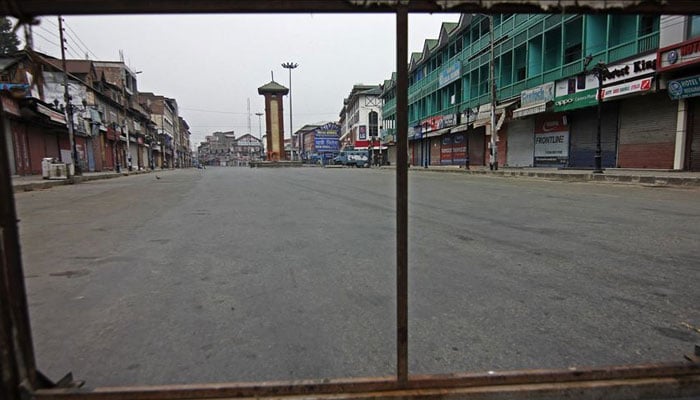‘Demographic flooding’: India introduces new Kashmir domicile law
SRINAGAR: The Indian government has announced a new set of laws for Indian-administered Kashmir, including domicile rights for Indian citizens, that experts and residents fear will alter the demographic status of the Muslim-majority Himalayan region.
Under the new law, those who have resided for a period of 15 years in the Indian Occupied Kashmir (IOK) or studied for a period of seven years and appeared in Class 10/12 examinations in educational institutions located in the region are now eligible to become permanent residents. The announcement came nearly eight months after the Indian government stripped the disputed region of its limited autonomy that had protected the region for decades from demographic changes.
The new law announced by the Ministry of Home Affairs also provided domicile status to the children of central government officials who have served in IOK for a total period of 10 years. The notification by India's Hindu nationalist government comes as the country of 1.3 billion people is under a 21-day lockdown due to coronavirus fears.
The government changed the geographical and political status of the IOK on August 5 after it abrogated Article 370 - a law that restricted rights over jobs, scholarships and land to the permanent residents of the valley.
While the law has triggered fear among Kashmiris about the "permanent settlements by the outsiders", the experts say it will lead to "demographic flooding". "It is a lot to circumvent the law. I think it illustrates clearly that some will not stop from politicking during coronavirus," Siddiq Wahid, a political analyst based in the IOK told a foreign media outlet, referring to the current coronavirus crisis.
"Obviously it is an attempt to change the demographics, not only change but flood it. It will lead to demographic flooding," Wahid said. He said the change of law "is much larger than [the issue of jobs]". "I am not even thinking about jobs."
Sheikh Showkat Hussain, professor of legal studies based in the region, said: "It was in the offing." "The whole purpose of revoking Article 370 was to settle outsiders here and change the demography of the state. Now this provides the modalities and entitles so many categories of Indians whose settlement will be legalised over here."
According to the new law, jobs up to the lowest level of non-gazetted rank are reserved for Jammu and Kashmir domiciles. Khurram Parvez, a human rights defender based in the region, said: "By virtue of this order, outsiders are also going to be the claimants of jobs in Jammu and Kashmir, which already has a huge unemployment problem. This is an act against the interests of unemployed youth."
-
 Prince Harry Warns Meghan Markle To 'step Back'
Prince Harry Warns Meghan Markle To 'step Back' -
 Selena Gomez Explains Why She Thought Lupus Was 'life-or-death'
Selena Gomez Explains Why She Thought Lupus Was 'life-or-death' -
 New Zealand Flood Crisis: State Of Emergency Declared As North Island Braces For More Storms
New Zealand Flood Crisis: State Of Emergency Declared As North Island Braces For More Storms -
 Nancy Guthrie Case: Mystery Deepens As Unknown DNA Found At Property
Nancy Guthrie Case: Mystery Deepens As Unknown DNA Found At Property -
 James Van Der Beek's Brother Breaks Silence On Actor's Tragic Death
James Van Der Beek's Brother Breaks Silence On Actor's Tragic Death -
 Megan Thee Stallion On New Romance With Klay Thompson: 'I'm Comfy'
Megan Thee Stallion On New Romance With Klay Thompson: 'I'm Comfy' -
 Nicole Kidman Celebrates Galentine’s Day Months After Keith Urban Split
Nicole Kidman Celebrates Galentine’s Day Months After Keith Urban Split -
 Justin Bieber Unveils Hailey Bieber As First Face Of SKYLRK In Intimate Campaign Debut
Justin Bieber Unveils Hailey Bieber As First Face Of SKYLRK In Intimate Campaign Debut -
 Caitlin O’Connor Says Fiance Joe Manganiello Has Changed Valentine’s Day For Her
Caitlin O’Connor Says Fiance Joe Manganiello Has Changed Valentine’s Day For Her -
 Rachel Zoe Sends Out Message For Womne With Her Post-divorce Diamond Ring
Rachel Zoe Sends Out Message For Womne With Her Post-divorce Diamond Ring -
 James Van Der Beek's Final Conversation With Director Roger Avary Laid Bare: 'We Cried'
James Van Der Beek's Final Conversation With Director Roger Avary Laid Bare: 'We Cried' -
 Jaden Smith Walks Out Of Interview After Kanye West Question At Film Premiere
Jaden Smith Walks Out Of Interview After Kanye West Question At Film Premiere -
 Michelle Obama Gets Candid About Spontaneous Decision At Piercings Tattoo
Michelle Obama Gets Candid About Spontaneous Decision At Piercings Tattoo -
 Why Halle Berry Wasn't Ready For Marriage After Van Hunt Popped Question? Source
Why Halle Berry Wasn't Ready For Marriage After Van Hunt Popped Question? Source -
 Bunnie Xo Shares Raw Confession After Year-long IVF Struggle
Bunnie Xo Shares Raw Confession After Year-long IVF Struggle -
 Brooks Nader Reveals Why She Quit Fillers After Years
Brooks Nader Reveals Why She Quit Fillers After Years




